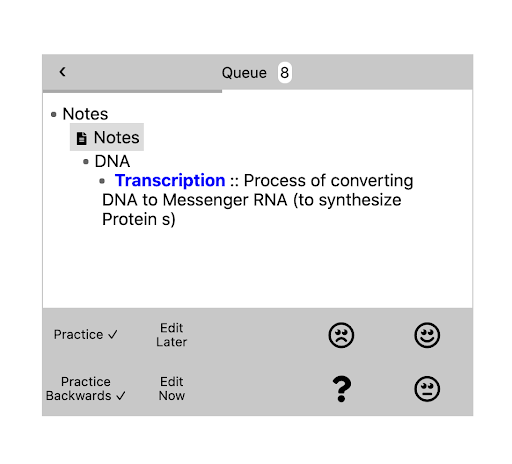How to add Active Recall to your Study Routine
By: Kelsey Cheng ‘25
We’ve all been there––rereading your textbook for the third time at 1 AM, hoping that the test won’t be that hard. Like many students, I studied by highlighting notes and rewatching zoom lectures. While this may work for some, there are other ways to absorb learning material. In honor of midterms week, I tried out a new method of studying called active recall that’s supposed to increase memory retention and decrease hours spent at Leavey.
What is active recall?
Active recall is a study method that involves retrieving information from memory and testing yourself throughout the studying process. This strategy forces you to use more mental power to actively pull information from your brain, as opposed to passively recognizing the information in a book, notes, or video.
Flashcards with Spaced Repetition
Making flashcards is a popular studying strategy, but now there’s a twist! Spaced repetition involves reviewing information at systematic time intervals. This concept is rooted in the Spacing Effect, the psychological idea that we learn things better when study sessions are spaced out. Here’s how you can implement spaced repetition through online flashcards.
1. Download an online flashcard app that uses spaced repetition, such as Anki (free) or Quizlet Plus ($20/year). Personally, I use a free program called Remnote, which automatically converts typed notes into flashcards. Through online flashcard programs, new and more difficult flashcards are shown more frequently, while older and less difficult flashcards are shown less. This way, you focus on certain topics that need more attention.
2. Make flashcards. Remember to keep answers short and sweet to avoid skimming.
3. Practice! On the app, you can rate your flashcards based on difficulty. Based on this rating, an algorithm determines which flashcards are shown.
4. Stick to the schedule. One of the strongest features of flashcard apps is that it creates a customized study schedule based on your performance. This system forced me to study my most challenging flashcards, and I saw that I progressively learned them faster after a couple of study sessions.
Overall, flashcards with spaced repetition make memorization easier and faster. I highly recommend this strategy to students in pre-med or other memorization-heavy courses.
Brain Dumping
Brain dumping is pretty self-explanatory. Paper. Pen. Go. Here’s how to master this study technique.
1. Take out a piece of blank paper and a pencil. A Google/Word Doc is fine, but handwriting is associated with increased memory retention.
2. Pick a topic and write! Toss grammar and spelling out the window. Write until you possibly cannot write anymore. Write until your brain and hand cramps up. For me, this took around fifteen minutes per subject.
3. Review. Go back to your notes and see what information you remembered and what you missed. Did you misdefine a vocabulary word? Did you forget a whole section altogether? This technique forces you to recall as much information, write it down, and point out what information you need to study in the future.
Self-generated Questions
How do you ace a test? Make one yourself. After every class, write down 5-10 questions and answers that relate to the material. Later on, you can review this study bank to prepare for a test. I suggest reading the questions and answers out loud, as if you were teaching a class. Through self-generated questions, you force yourself into test-taking mode every time you study.
Things to Keep in Mind
You still have to read the textbook, sorry. Unfortunately, active recall can’t replace your 100-page reading. However, it CAN make sure that textbook material sticks in your head longer.
Mix it up! Different strategies are better for different subjects. I use self-generated questions to study for writing-heavy subjects and flashcards for memorization-heavy subjects. Play around and experiment to find which active recall practices work for you!
Want more from Trojans 360?
Visit Trojans 360 on Facebook & Twitter to stay up to date with more student content! You can also Ask A Trojan an anonymous question, and we’ll try to answer it in a future post. And don’t forget to follow us on Instagram!
Trojans 360 is USC’s official student-run blog. Content created by students, for students.




